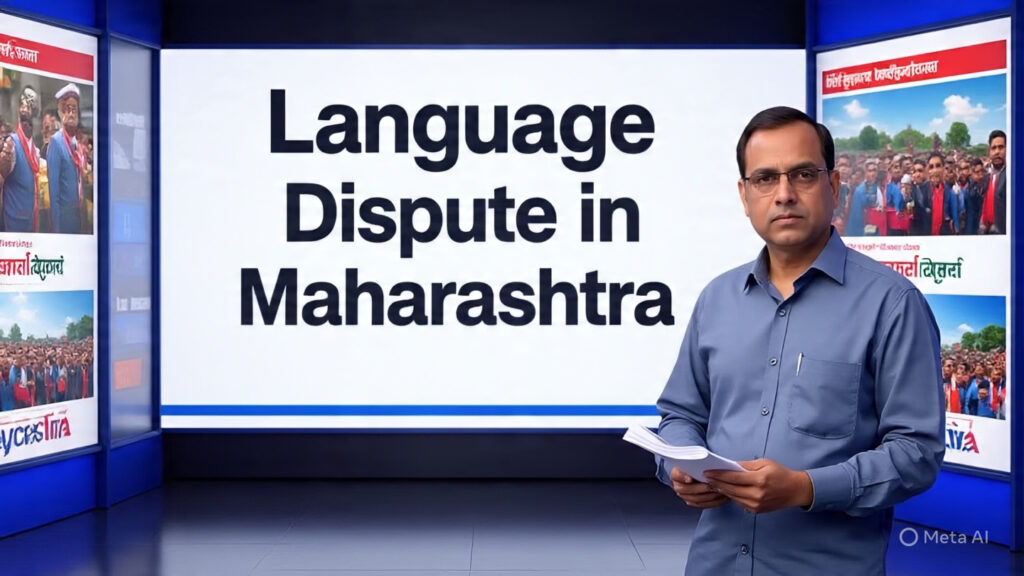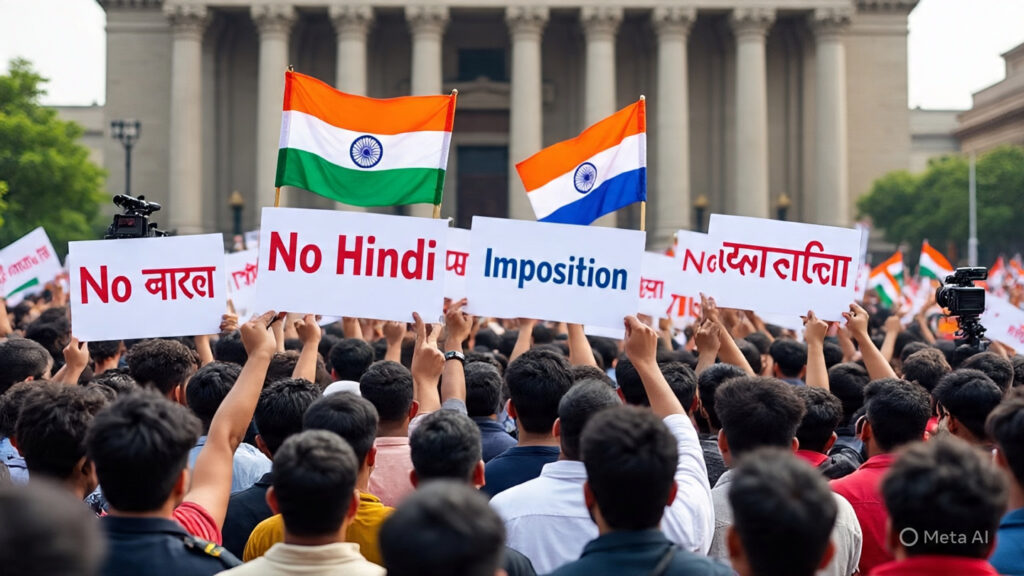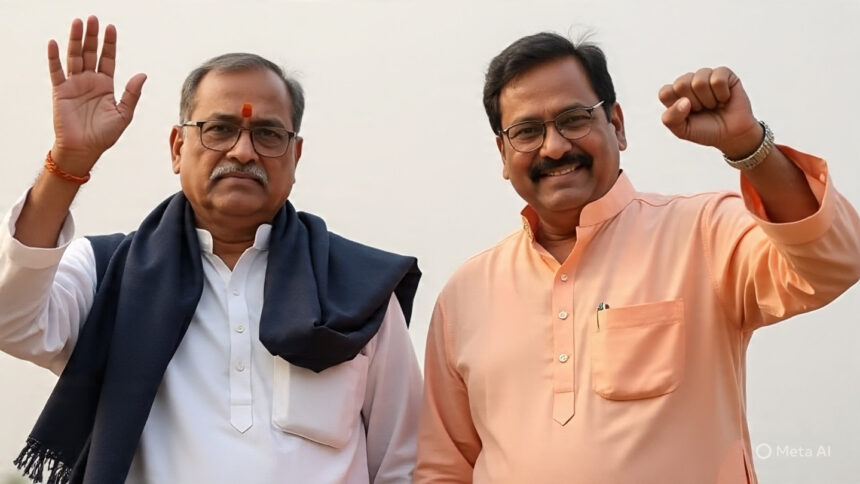Introduction:”Language Dispute”
For several weeks, a storm has been brewing in Maharashtra, India’s richest and most industrialised state. At the heart of the controversy lies a sensitive and emotionally charged issue—language and identity.
The spark came in April, when the Maharashtra government announced a policy mandating Hindi as a compulsory third language in all state-run primary schools.Language Dispute ,This was to be taught in addition to Marathi—the local language—and English, aligning with India’s National Education Policy (NEP).
But what the government framed as educational reform quickly escalated into a battle over cultural dominance, igniting political tensions and even violent incidents across the state.
National Education Policy and Its Role
India’s three-language formula has long existed under the NEP, first introduced in 1968 and updated periodically to reflect evolving educational goals. Language Dispute ,The latest revision, brought forward by Prime Minister Narendra Modi’s government in 2020, aims to ensure linguistic diversity while promoting national unity.
However, many critics argue that the real-world implementation of this policy often leans toward promoting Hindi, the most widely spoken language in India, but primarily spoken in northern and central states. In linguistically diverse regions like Maharashtra,Language Dispute , such moves are viewed with suspicion and sometimes hostility.
Opposition and Public Backlash
The Maharashtra government’s decision triggered massive backlash from civil society groups, language activists, and opposition political parties, who viewed it as a form of Hindi imposition.
Historically, language has been a cornerstone of identity in India, especially after the country’s independence in 1947. Many Indian states, including Maharashtra, were reorganized based on linguistic lines. Marathi, Language Dispute ,for the people of Maharashtra, isn’t just a medium of communication—it is a symbol of their heritage, pride, and regional autonomy.
Activists and opposition leaders accused the Bharatiya Janata Party (BJP)-led coalition government in Maharashtra of trying to erode this identity by mandating Hindi.

Why Hindi Imposition Feels Threatening
Over the years, the promotion of Hindi by federal governments—especially under the Hindu nationalist BJP—has stirred fears among non-Hindi-speaking populations. Language Dispute ,The influx of migrants from Hindi-speaking states like Uttar Pradesh and Bihar into cities like Mumbai has amplified concerns that local language and culture may be sidelined.
Abhay Deshpande, a political analyst, points out that anxiety over linguistic identity has intensified since the BJP came to power in 2014, with several top leaders making controversial remarks promoting Hindi as a “national language.”
Government U-Turn: Too Little, Too Late?
Faced with growing unrest and criticism, the Maharashtra government eventually revoked the Hindi mandate and announced the formation of a review committee to reassess the policy. However, the damage had already been done. Language Dispute ,The issue continues to dominate public discourse and shows no sign of fading away.
This language row comes at a politically sensitive time, just months before the municipal elections, including in Mumbai, home to India’s wealthiest municipal corporation.
Violence on the Ground:”Language Dispute “
Language Dispute ,
Beyond heated debates and political finger-pointing, the controversy has also spilled into violence:
- In Thane district, two women were allegedly assaulted in their housing complex after they used the phrase “excuse me” rather than speaking in Marathi.
- In Mumbai, a security guard was reportedly beaten up by workers from the Maharashtra Navnirman Sena (MNS), a regional party known for its aggressive Marathi-centric stance, for not knowing Marathi.
- A viral video showed a shopkeeper being assaulted by alleged MNS workers for communicating in a non-Marathi language, sparking widespread outrage.
These incidents underscore how language, when politicized, can create an atmosphere of fear and hostility.

Political Realignments: Thackeray vs Thackeray No More?
Interestingly, the controversy has led to an unexpected political development. Long-time rivals Uddhav Thackeray, leader of the Shiv Sena (UBT), and Raj Thackeray, chief of the MNS, appeared together at a joint rally opposing what they call “Hindi imposition.”
Both men are heirs of Bal Thackeray, the founder of the original Shiv Sena party, which rose to prominence in the 1960s with its nativist and pro-Marathi ideology. Language Dispute ,Their public truce, nearly two decades after splitting politically, could reshape electoral strategies for the upcoming municipal polls.
Political analyst Prashant Dixit says this realignment could resonate with voters, especially in Mumbai, where language and local pride have long been pivotal issues.
Historical Context: Linguistic Nationalism in Mumbai
The Shiv Sena’s roots lie in anti-migrant rhetoric. In the 1960s and 70s, it campaigned aggressively against migrants from southern India. In later decades, it shifted its focus to northern migrants, blaming them for job shortages and overpopulation in Mumbai.
Data from the 2011 Census revealed a 40% increase in the Hindi-speaking population in Mumbai since 2001, further intensifying these sentiments. Language Dispute ,Historically, such campaigns have found a receptive audience in the city, and political analysts believe that similar rhetoric may still have electoral appeal.
Criticism and Call for Real Issues
Despite the political theatrics, many believe this focus on language is distracting from real issues like employment, infrastructure, and economic development.
An editorial in the Indian Express, titled “Slap in Mumbai’s Face”, condemned the linguistic politics as “deeply troubling.” Language Dispute ,The article warned that parochialism often escalates into violence and has no place in a progressive, industrialised state like Maharashtra.
Prashant Dixit agrees, stating that long-term support for such movements is unlikely unless they are backed by real development. “Voters today want progress—better jobs, sound governance, and inclusive policies,” he said.
Conclusion: Identity or Politics?
What began as an educational policy shift has spiraled into a complex issue of identity, politics, and violence. Language Dispute ,With elections around the corner and emotions running high, the language row in Maharashtra is far from resolved.
Whether it leads to lasting political change or is remembered as another short-lived controversy will depend on how leaders respond—not just with rhetoric, but with policies that truly address the needs of the people.

